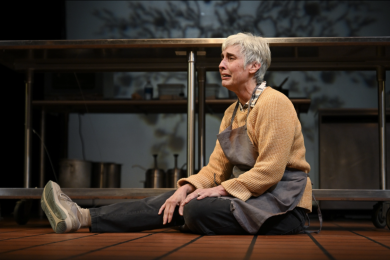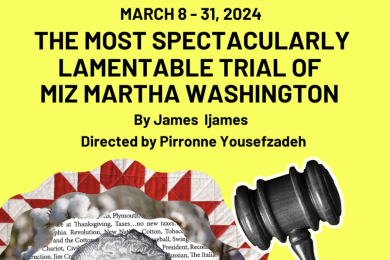History, repeating

If your Facebook news feed is anything like mine, hashtags swarm the screen:
#FreddieGray #JusticeForFreddieGray #BlackLivesMatter #Baltimore #BaltimoreUprising #BlackSpring #MNRiseUp #NoJusticeNoPeace #blackisbeautiful #RestInPower #ResistanceIsExistence
The fury and heartbreak over recent events in Baltimore remind us of so much: structural injustices, poverty and hopelessness, internalized and perpetuated oppression, the ethics of reporting, issues of race and equity, police brutality, and the criminalization of entire communities.
Yet regardless of how you feel about the unfolding charges against the Baltimore police and Freddie Gray, or how you contextualize this incident amidst a history of police brutality across our country, this story is all too familiar.
The latest show at Penumbra Theatre speaks directly to this sobering pattern of systemic injustice. Welcome to Detroit ‘67.
Same as it ever was
Dominique Morisseau’s script revolves around siblings Chelle and Lank. Having inherited a sum of money from their deceased parents, the two heatedly disagree over next steps. Chelle, a widow, wants to keep their savings and continue hosting underground dance parties in their basement to support her son in college; Lank, her younger brother, wants to use these savings to purchase a new bar downtown, imagining a new world of possibility and a more steady cash flow from a legitimate business. While facets of this story may seem universal, as young black folks living in 1967 Detroit, Chelle and Lank face specific insurmountable obstacles based on their race.
One night, Lank and his friend Sly find a beaten white woman in the street and, taking pity, take her home for Chelle to tend to her wounds. The presence of this white woman, Caroline, heightens existing tensions between men and women, police and civilians, and black and white communities in this play. With nowhere else to go, Caroline stays in the house to tend bar for Chelle and Lank’s parties.
Sly convinces Lank to invest in their future and purchase the bar behind Chelle’s back. A late-night police raid of a club downtown and the subsequent display of black civilians fighting white cops ignites existing tensions between those in uniform and those they swore to protect. Suddenly Lank’s investment in the bar downtown ropes them all into a terrifying world of police sirens and raids, shots fired and ribs broken, and criminalized black bodies--today known as the 1967 Detroit “race riots.”
In the midst of this tapestry lie several other character threads, but above all else, each character wrestles with stifling bitterness as a result of the rights and freedoms denied them—expressions of systemic racism against African Americans in the United States.
Stunning theatricality
Sound designer Martin Gwinup uses iconic video and sound recordings to remind the audience of the Summer of 1967 in Detroit: Veterans returning from Vietnam, evocations of crushing poverty and unemployment concentrated in black neighborhoods, and the sounds of Motown as a soundtrack for black agency and hope.
Austene Van is stunning as Chelle—whether she is dancing onstage, arguing with the record player, untangling and laying out Christmas lights, or simply standing her ground within her family with poise and charm. Throughout the piece, Van instills her performance with deep sorrow, unyielding loyalty, and powerful strength and resilience.
Jamecia Bennett as Bunny wins over the audience, shifting effortlessly from painful realizations of love and violence to casual lewd remarks about men and women and everything in between. (“Don’t look at me like I got some kind of titty in the middle of my forehead!”) Outfitted in Aaron Chvatal’s bold costumes, Bunny complements Chelle’s classic look with brightness but also a depth all her own.
Darius Dotch plays Lank as equal parts the charmer and the dreamer. His friendship with James T. Alfred’s Sly illustrates the strength and pride of brotherly love amidst the destructive imagery of black male bodies as looters and arsonists.
And, Shirley Jo Finney’s direction weaves together all this beautifully rich and painful material, seemingly aware all the while how similar to today these 1967 newscasts sound. Just look at this new TIME magazine cover, for starters.
Morisseau’s writing provides keen insights into this world--a world that we are still grappling with in 2015.
The consequences of this system
These insights breathed sadness and solace into my heart, so I want to note them here:
Near the beginning of the piece, Lank shakes his head while discussing the disproportionate numbers of Black men harassed, beaten, and incarcerated by the police: “Picking out n****** ain’t gonna do anything but lock away a lot of potential...ain’t no telling what Detroit could be [otherwise].”
Does that truly sound any different from what Black community members in Baltimore, Oakland, DC, Minneapolis, or Jacksonville are saying today?
Need we remind ourselves that almost 1 million Black people in the US live behind bars? What of all the potential fathers and leaders, teachers and organizers, chemists and business-owners whose lives are forever stigmatized from incarceration?
Lank continues: “[Just] give us some business of our own...I’m ready to be above ground [at last]....[Let’s] make Detroit some kind of Mecca.” All this man asks for is a chance at a legitimate business, a chance to contribute to his own communities and put his city back on the map. Chelle describes Lank and Sly as businessmen and dreamers--far cries from the way the media inevitably characterizes such men in torn, bloody clothes. Listening to a radio report, Sly shakes his head at the whitewashed reporting of looting and riots and fires: “Making like we just hate honkeys and burning shit up. Naw, this is about pigs hating n******!”
Enter the white woman
The introduction of Caroline (played by Elizabeth Efteland) ignites thought-provoking revelations on all sides: Bunny dismissively notes, “White girls is a natural aphrodisiac,” laying the groundwork for Lank and Caroline’s budding romantic relationship. Seeing their mutual interest, Chelle argues frantically with her brother to protect him. (“It’s like you get close to her and you forget what you are...It’s my job to love you best.”) In the meantime, Caroline and Lank bond over their abuse at the hands of the city police.
All this tension erupts into a stunningly written and staged argument between the three women. Chelle accuses Caroline of offering Lank false hope: “Link got a lot of blind spots. I got 20/20. [You] make him believe that it’s all possible...to be like you, to dream like you. And it’s not.”
Chelle concedes that both have sustained abuse from cops, but draws a firm line between Caroline and Lank: “If you survive [the police beatings], you can leave. Live a new life. No boundaries . . . Everywhere we go, the lines is real clear.” Chelle identifies the particular piece of Lank that Caroline can never quite address: how the world sees his skin color. “You might have the same dreams, the same heartbreak--but you will never be the same. That ain’t blindness tell me that,” Chelle tells Caroline, trembling with rage and injustice and fear at a world that has already taken too many Black men from her life.
After Caroline leaves, Chelle admits to Bunny the powerlessness and inferiority she felt in comparison. Lank’s preference for Caroline over Bunny hurt Chelle deeply: “Like we’re not enough. Like there was something better in her than we got in us.”
This was perhaps my favorite moment of the play: hearing these black women critically discuss the role of the white woman. Somehow, despite all the competing parts of this Black household, the story becomes about Caroline after her introduction. Somehow, these strong Black women are thrown by her addition, somehow Link is charmed by her presence. But isn’t this a story about a Black woman? Surely the womansong (Penumbra’s season theme) belongs to Chelle?
This portion of the text resonated with me very strongly. It sounded like Chelle argued that Caroline contributed to Lank’s departure from his own Blackness, an integral reality for him in 1967 Detroit.
Wrestling with uncomfortable questions
The dialogue forced me to consider: To what extent does the love or affection of a white woman “legitimize” a person of color? To what extent can we interpret interracial relationships as transgressing the norm, of ignoring the limits of color? To what extent do these “limits” still exist in 2015?
As a woman of color, I found myself grappling with these questions silently and a self-critical eye. With no satisfying conclusion at hand, I instead have to concede that I will keep asking myself these questions my entire life. Just what role do the intersections of race, sex, and sexuality play in “legitimizing” persons and performing power? (Does wrestling with these questions actually accomplish anything?)
Mental gymnastics aside, I cannot recommend this show enough. I found the technical aspects smart, the performances beautifully complex, and the text quite rich.
Equal parts hilarious and heart-breaking, director Shirley Jo Finney presents a deeply satisfying piece here. Equal parts discouraging and empowering, I hope this work stays with you far outside the theater.
Because #BaltimoreUprising
Because #NoJusticeNoPeace
Because #BlackLivesMatter




